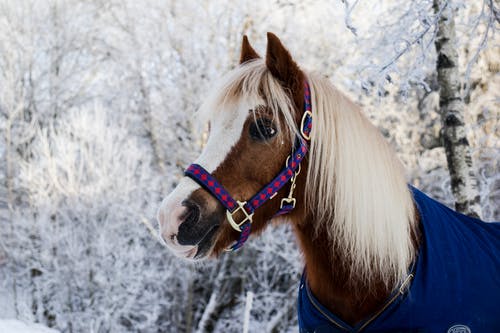
The arrival of fall means it’s time for beautiful leaves, cooler temperatures, and to help our horses get ready for winter. Even before the air gets cooler, as soon as the days start shortening they begin shedding their summer coat in order to grow their thicker, coarser winter coat. So too should we start preparing to help them transition to winter. Here are some things you can do to make the switch to the cold months easier for both you and your horse.
Grooming
Grooming in general is needed in order to keep your horse’s coat clean and healthy. As your horse grows their winter coat, you want to help them get rid of the shorter, thinny summer hairs they’re shedding. Grooming blocks, curry combs, and other products designed to help with shedding hair will help you help your horse, in addition to your normal brushes.
Exercise
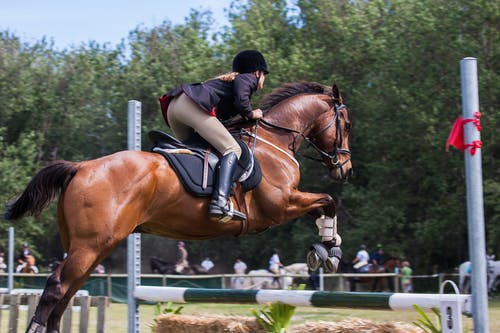
When it’s cold, many horse owners are more reluctant to head out to the stables and exercise their horse. Often, people will give their horses the winter months off and pick up riding again in the spring. Horses need exercise in order to stay in good shape, though, and given months off of work can present challenges when you come back to it in the warmer months.
Keeping your horse on an exercise schedule throughout the fall and winter will both make them easier to handle than if you’d let them have a months-long break and keep them healthier and happier. You want to take extra care to warm your horse up and cool them down during rides.
The fall is a good time to prep your riding areas for winter too. You don’t want to ride somewhere slippery, as it could result in serious injury for your horse and you. Consider winterizing your arena or seeing if there is an indoor arena or outdoor space that you can keep dry so that you can maintain your horse’s exercise routine.
Nutrition
A good diet is important always, but especially when it is cold and you need good food in order to help you stay warm. Because we rely on food as a method in order to stay warm, this means that when it is colder, your horse might need more of it in order to maintain their weight, since they are burning more energy in preserving their body heat. Consider if your horse may need extra hay or supplements for the colder months in order to prevent winter weight loss, and if you can start stocking up on it.
Wormer
Different vets will say different things about how often you should deworm your horse. Generally, it’s recommended that they are dewormed every 6 months, though some vets will say every season, or every 2 months. Different schedules work for different animals, but it’s good to stay on top of your horse’s deworming and switch up your wormers, so that you aren’t using the same one each time.
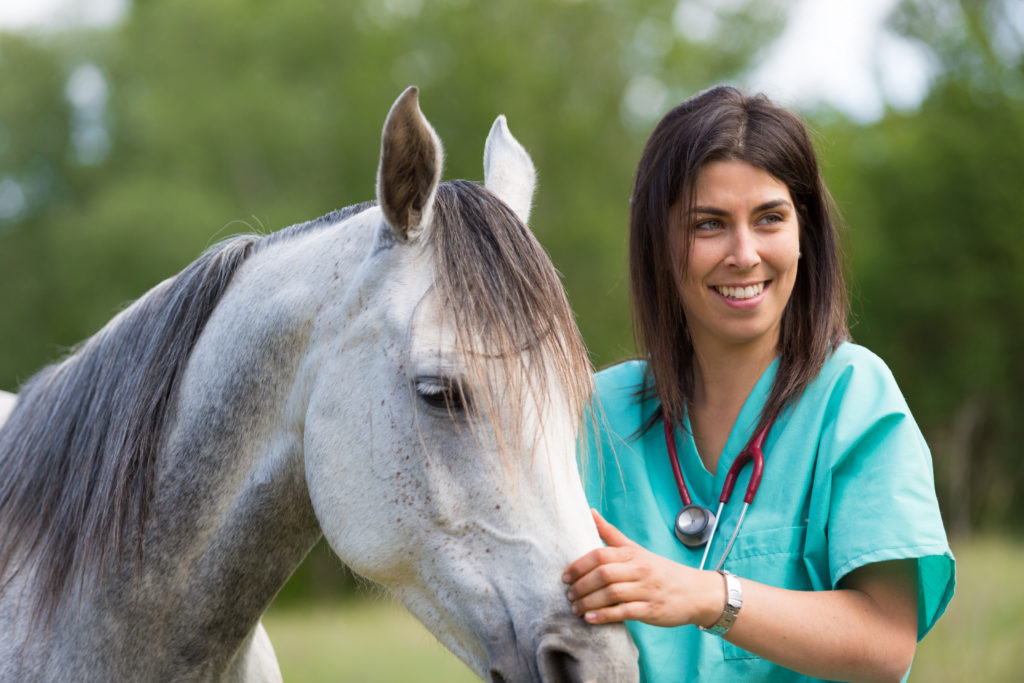
Vaccinations
Just like humans, horses need vaccines in order to protect them from disease. Your vet will recommend a schedule for your horse that it’s vital for you to adhere to in order to keep them healthy. Usually, this means vaccines in the spring and in the fall.
It’s important to call your vet and have your horse vaccinated before winter arrives. The core vaccines your horse needs every year vary based on your area and whether or not you show or otherwise travel often. Your vet will know what vaccines your horse needs and when. With temperatures dropping and the risks of colds increases, you don’t want a sick horse too.
Water
For many horse owners, winter causes concern for your horse’s water intake. Horses drink a lot of water, and if it’s frozen over, they can’t access it. You may consider installing an automatic waterer, like Bar Bar A’s Automatic Horse Drinker, that won’t freeze over and will provide your horse with good, clean water that isn’t frigid all winter long. That way, you can rest assured that your horse is able to stay hydrated and that the cold won’t affect how much water they are able to get.
Floating
The health of a horse’s teeth doesn’t just affect their teeth, but also their overall health and behavior. If you’ve been having behavioral issues with your horse, it could be related to their teeth. Maintaining your horse’s teeth is essential for preventing behavioral problems tooth issues can cause, and especially for the overall health of your horse. Going into the colder months, you want your horse as healthy as possible, so see if your horse might be due for a float.
Blanketing
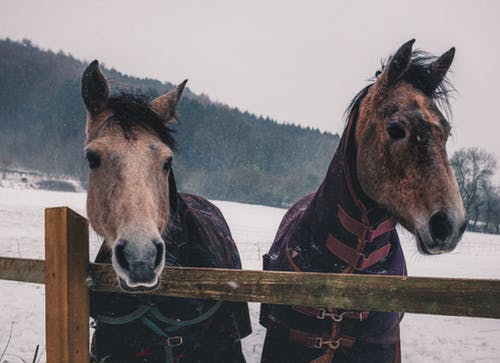
Horses grow a natural coat in order to keep themselves warm throughout the fall and winter months. Generally, horses are perfectly fine without a blanket and how thick their coat grows depends on how cold the area you live in gets. In some cases though, you may wish to provide them with a blanket, such as if they have thin hair, have been recently clipped, or are not from a cold area.
Some horse owners wish to blanket their horses in order to maintain the sleek, thin summer coat. If you do this, it’s important to have blankets of different weights and to maintain them so that your horse will stay warm. You also need to watch them to ensure that they are not too hot under the blanket, as this can make them sick.
Blankets come in different thicknesses from light, to medium, to heavy, and can be made of a number of different materials, including waterproofed ones. As temperatures change, you can switch the thicknesses to whatever one is best suited to the current climate. Whether or not you let your horse’s winter coat grow, you want to make sure that your horse will be warm.
Shelter
Fall is the time to repair any outdoor shelters you have for your horse and see if any repairs are needed around the barn before the snow hits. It’s harder to repair damaged shelters and barns when there’s snow, and they can let cold and snow and resulting moisture into the stable. Getting your shelters fixed will ensure that your horse has a dry space that provides relief from wind and wet that they can utilize if they want.
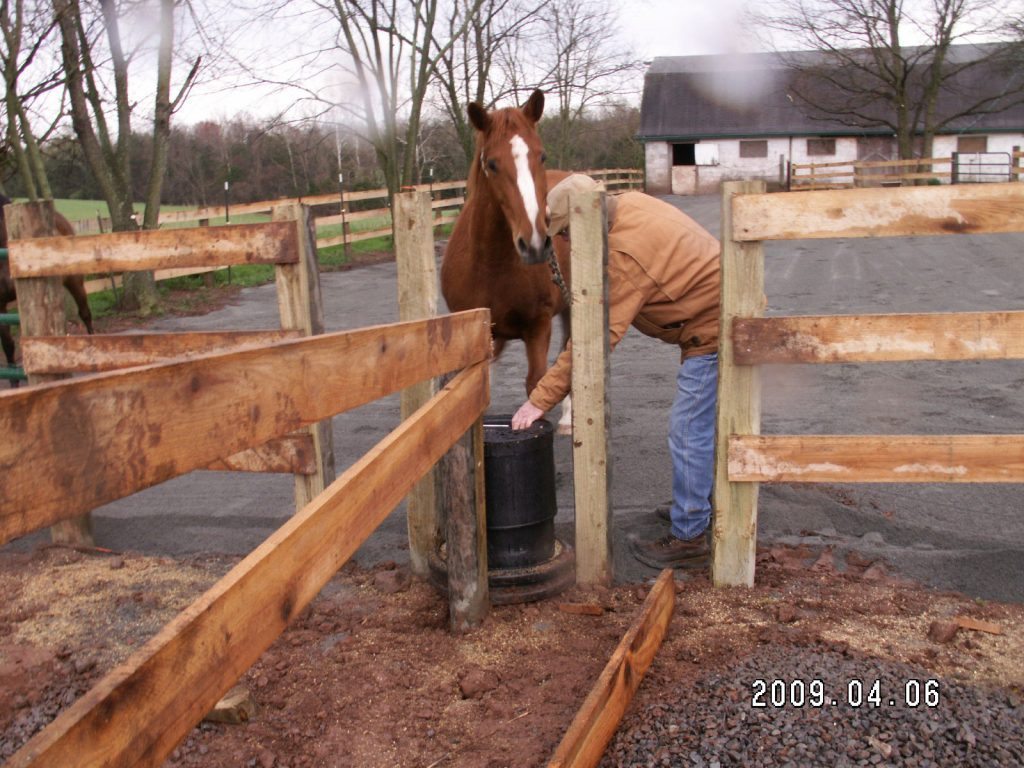
There are many ways to help your horse transition to winter, and to make it easier for yourself too! If you would like to consider installing an automatic waterer so that you can provide your horse with plenty of water to drink, Bar Bar A has a number of options you can choose from. We want to help you rest easy about knowing your horse has a dependable water supply. For any questions, please contact us at Bar Bar A today!

Leave a Reply